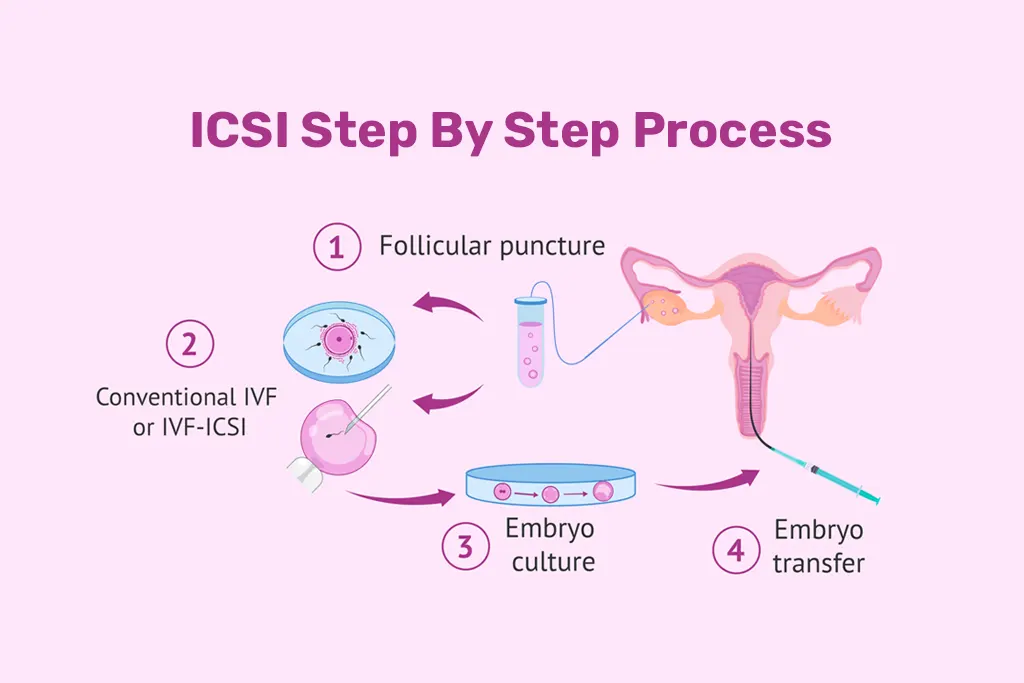What Is ICSI Treatment?
ICSI is the short form for Intracytoplasmic Sperm Injection. It is a treatment that involves injecting a single sperm into an egg to help in fertilisation. The procedure is for patients with sperm-related issues such as:
- Very low sperm count
- Sperm are abnormally shaped or don’t move normally
- IVF was previously done but with no success
How IVF and ICSI Are Different?
ICSI is a type of IVF treatment. In IVF, your doctor places many sperm cells with an egg in a specialised dish. They check if one of the sperm reaches the egg and fertilises and if it is up to the mark. If none of the sperm fertilises the egg, conception (also known as fertilisation) does not occur.
ICSI increases the chances of fertilisation as the specialists directly inject a single sperm into a single egg. However, ICSI does not guarantee fertilisation. In both ICSI and IVF, your doctor places the fertilised egg (embryo) in the uterus. Pregnancy happens when the embryo attaches to the lining of your uterus.
Step-By-Step Procedure of ICSI
The following steps sum up the ICSI procedure:
Initial Phase
When this process begins, the female patient has to undergo fertility testing. It includes an inspection of the uterus and fallopian tubes and a hormonal analysis. The male will also have to go for his sperm analysis. After checking all of the results and tests, your doctor will get an idea about your health and will recommend the right treatment.
Ovarian Stimulation Phase
In this phase, you will have to stimulate your ovaries to develop as many follicles or egg-containing vesicles as possible. It will be done by injecting hormonal drugs on the second or third day of your period and every day for the next 9 to 12 days. The goal is to develop follicles that produce mature eggs that can be collected and used to achieve pregnancy. After the results, doctors will give you some medicines and prepare the egg for ovulation. It will allow eggs to be released from the follicle walls so that the doctor can perform the egg retrieval procedure.
Egg Retrieval and Sperm Collection Phase
Doctors will perform a little surgery to extract mature eggs from your follicle after 36 hours from the trigger shot. They will use ultrasound to insert needles into your pelvic cavity for egg retrieval. They will also retrieve your partner’s sperm on the same day of your egg retrieval. The collected semen is allowed to liquefy for around 30 minutes before being washed to remove debris, immobile sperm, and other undesired particles. They will then analyse the processed semen to check sperm quality. After this, doctors will decide whether IVF or ICSI will be used for infertility treatment.
ICSI Fertilization
ICSI includes the selection of a healthy sperm for each mature egg. The IVF doctor will repeat the procedure for each egg. The fertility centre will then examine the fertilisation status the next day.
Embryo Development
After the eggs and sperm are fertilised, they develop into embryos. After that, they will be kept in an incubator for 5-6 days until they reach the blastocyst stage and are ready to be transferred into and implanted in the lining of your uterus.
Embryo Transfer
After embryo development, the embryologist will pick one or more blastocysts to be transplanted back into your uterus to grow and make you pregnant. The embryologist will insert the blastocyst into the uterine cavity wall, with the help of ultrasound imaging, where it will implant and begin to grow and develop. After two weeks, they will do an ultrasound to confirm the pregnancy.
Embryos are nourished in an environment where they can flourish. This environment allows specialists to monitor development, ensuring that embryos receive the resources they require to grow. Monitoring embryo development allows doctors to identify healthy embryos. The grown embryos should meet strict criteria, and then they are chosen for transfer. This selection method increases the likelihood of successful implantation. It is important in the process of achieving pregnancy via ICSI treatment.
Conclusion
ICSI is a valuable technique within IVF treatment that significantly improves fertilisation rates for couples facing male infertility issues like low sperm count, poor motility, or previous unsuccessful IVF attempts. While ICSI doesn’t guarantee pregnancy, it offers a higher chance of successful fertilisation compared to standard IVF. If you’re considering ICSI, consult a qualified fertility specialist to discuss your situation and the best course of treatment for you.

